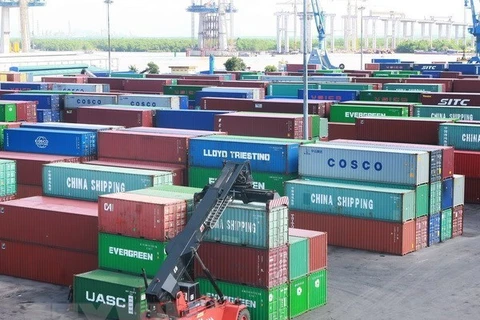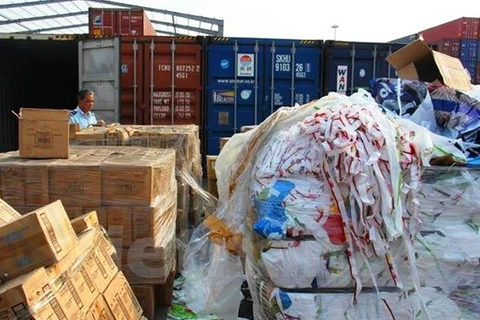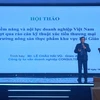 Business associations have voiced their support for stricter management of scrap imports. (Photo: VNA)
Business associations have voiced their support for stricter management of scrap imports. (Photo: VNA) Hanoi (VNA) – Business associations have voiced their support for stricter management of scrap imports, but they also underlined the need to continue importing these goods to serve domestic production.
The Ministry of Natural Resources and Environment (MoNRE) hosted a meeting in Hanoi on July 24 to look into the scrap import situation.
Deputy Director General of the Vietnam Environment Administration Hoang Van Thuc said scrap imports into Vietnam increased sharply in the first few months of 2018 and are forecast to continue rising for the time ahead. The congestion of imported scrap materials at seaports is currently a great public concern as it has affected the operation capacity of ports and shipping companies, slowing down their flow of goods, he added.
A large volume of scrap imports are currently stuck at ports in Ho Chi Minh City. As of June 26, up to 4,480 containers of scrap materials had been stuck at the ports under the Saigon Newport Corporation’s management for at least 30 days. Up to 3,464 of the containers are at Cat Lai Port.
Meanwhile, 737 containers have been stored for more than 90 days and 507 others have stayed for between 30 and 90 days at ports in northern Hai Phong city.
About 20 percent of the imported scrap is paper, and the rest is plastic and other types of scrap materials, according to the MoNRE.
Minister Tran Hong Ha said it is necessary to overhaul legal documents on scrap imports in line with the laws on environmental protection, trade and customs, and the maritime code. In particular, specific mechanisms need to be created to manage and control scrap trading activities before scrap enters Vietnam, he said, adding that technical standards should also be tightened to ensure that imported scraps are clean.
He urged stricter control on temporary imports of scrap for re-export out of Vietnam.
The MoNRE is also asking Prime Minister Nguyen Xuan Phuc to permit the removal of scrap types which either may pollute the environment or can be supplied locally from approved import lists.
Supporting the stricter management of scrap imports, business associations said it will also help improve enterprises’ awareness of using clean materials.
Vice Chairman of the Vietnam Steel Association Nguyen Van Sua said banning the import of unqualified scrap or scrap that can be sourced domestically or is not in demand is an appropriate action. However, take Vietnam’s steel industry for example, it is growing strongly and yet the domestic supply of ore, bituminous coal, and scrap metal is not enough to meet its needs, and so these materials still need to be imported, he said.
A representative of the Vietnam Pulp and Paper Association said although there are only two pulp factories in the country at present, the industry produces up to 3.6 million tonnes of paper. The association suggested authorised agencies license the import of scrap paper basing on production demand.
Meanwhile, Secretary General of the Vietnam Plastics Association Huynh Thi My said the industry has demand for about 5 million tonnes of plastic materials each year, but only 20 percent of that is supplied domestically.
Therefore, plastics companies still need to import scrap plastics to serve production. To minimise environmental pollution, the sector will set up an industrial park using modern technologies to collect and recycle plastics, she added.–VNA
VNA





















